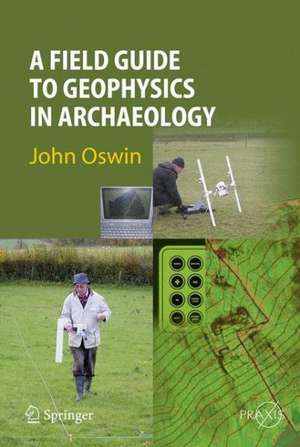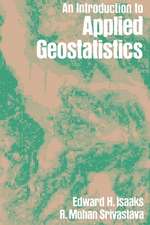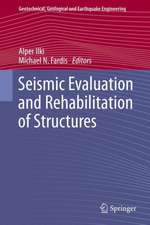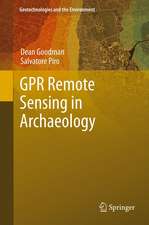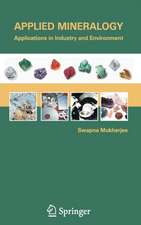A Field Guide to Geophysics in Archaeology: Springer Praxis Books
Autor John Oswinen Limba Engleză Hardback – 26 mai 2009
Dr John Oswin is in charge of the geophysics operation of the Bath and Camerton Archaeological Society and his work has recently been the subject of a television programme. He has taught many students how to use geophysical equipment.
| Toate formatele și edițiile | Preț | Express |
|---|---|---|
| Paperback (1) | 889.60 lei 43-57 zile | |
| Springer Berlin, Heidelberg – 22 noi 2010 | 889.60 lei 43-57 zile | |
| Hardback (1) | 900.01 lei 43-57 zile | |
| Springer Berlin, Heidelberg – 26 mai 2009 | 900.01 lei 43-57 zile |
Din seria Springer Praxis Books
-
 Preț: 294.46 lei
Preț: 294.46 lei -
 Preț: 223.45 lei
Preț: 223.45 lei -
 Preț: 193.12 lei
Preț: 193.12 lei -
 Preț: 167.85 lei
Preț: 167.85 lei -
 Preț: 288.98 lei
Preț: 288.98 lei -
 Preț: 323.74 lei
Preț: 323.74 lei -
 Preț: 376.08 lei
Preț: 376.08 lei -
 Preț: 264.12 lei
Preț: 264.12 lei - 8%
 Preț: 517.61 lei
Preț: 517.61 lei -
 Preț: 190.01 lei
Preț: 190.01 lei -
 Preț: 218.16 lei
Preț: 218.16 lei -
 Preț: 312.06 lei
Preț: 312.06 lei - 17%
 Preț: 401.17 lei
Preț: 401.17 lei -
 Preț: 216.41 lei
Preț: 216.41 lei -
 Preț: 262.27 lei
Preț: 262.27 lei -
 Preț: 264.35 lei
Preț: 264.35 lei -
 Preț: 167.63 lei
Preț: 167.63 lei -
 Preț: 259.52 lei
Preț: 259.52 lei -
 Preț: 259.08 lei
Preț: 259.08 lei -
 Preț: 305.47 lei
Preț: 305.47 lei -
 Preț: 234.01 lei
Preț: 234.01 lei -
 Preț: 227.85 lei
Preț: 227.85 lei -
 Preț: 259.95 lei
Preț: 259.95 lei -
 Preț: 295.56 lei
Preț: 295.56 lei -
 Preț: 357.17 lei
Preț: 357.17 lei -
 Preț: 275.79 lei
Preț: 275.79 lei -
 Preț: 257.08 lei
Preț: 257.08 lei -
 Preț: 349.71 lei
Preț: 349.71 lei -
 Preț: 272.45 lei
Preț: 272.45 lei -
 Preț: 270.27 lei
Preț: 270.27 lei - 8%
 Preț: 433.24 lei
Preț: 433.24 lei -
 Preț: 327.03 lei
Preț: 327.03 lei - 8%
 Preț: 394.80 lei
Preț: 394.80 lei -
 Preț: 320.65 lei
Preț: 320.65 lei -
 Preț: 325.29 lei
Preț: 325.29 lei -
 Preț: 253.11 lei
Preț: 253.11 lei -
 Preț: 192.86 lei
Preț: 192.86 lei -
 Preț: 313.40 lei
Preț: 313.40 lei -
 Preț: 150.51 lei
Preț: 150.51 lei -
 Preț: 233.34 lei
Preț: 233.34 lei -
 Preț: 286.78 lei
Preț: 286.78 lei -
 Preț: 212.01 lei
Preț: 212.01 lei -
 Preț: 366.83 lei
Preț: 366.83 lei -
 Preț: 274.68 lei
Preț: 274.68 lei -
 Preț: 232.27 lei
Preț: 232.27 lei -
 Preț: 284.58 lei
Preț: 284.58 lei -
 Preț: 212.45 lei
Preț: 212.45 lei -
 Preț: 159.81 lei
Preț: 159.81 lei -
 Preț: 349.48 lei
Preț: 349.48 lei - 20%
 Preț: 2061.61 lei
Preț: 2061.61 lei
Preț: 900.01 lei
Preț vechi: 1097.57 lei
-18% Nou
Puncte Express: 1350
Preț estimativ în valută:
172.22€ • 180.26$ • 143.34£
172.22€ • 180.26$ • 143.34£
Carte tipărită la comandă
Livrare economică 31 martie-14 aprilie
Preluare comenzi: 021 569.72.76
Specificații
ISBN-13: 9783540766919
ISBN-10: 354076691X
Pagini: 210
Ilustrații: XVIII, 221 p.
Dimensiuni: 170 x 244 x 20 mm
Greutate: 0.7 kg
Ediția:2009
Editura: Springer Berlin, Heidelberg
Colecția Springer
Seriile Springer Praxis Books, Geophysical Sciences
Locul publicării:Berlin, Heidelberg, Germany
ISBN-10: 354076691X
Pagini: 210
Ilustrații: XVIII, 221 p.
Dimensiuni: 170 x 244 x 20 mm
Greutate: 0.7 kg
Ediția:2009
Editura: Springer Berlin, Heidelberg
Colecția Springer
Seriile Springer Praxis Books, Geophysical Sciences
Locul publicării:Berlin, Heidelberg, Germany
Public țintă
ResearchCuprins
1 Introduction. 1.1 Geophysics in Archaeology. 1.2 Geophysics and geology.1.3 What the pictures tell. 1.4 What this book aims to do.- 2 The basic science. 2.1 Electricity. 2.2 Magnetism. 2.3 Electromagnetic waves.- 3 The instruments. 3.1 Resistance meters. 3.2 Magnetometers. 3.3 Electromagnetic devices. 3.4 Ground radar. 3.5 Electronic distance measurement and GPS.- 4 Understanding the results. 4.1 Download software.4.2 Pattern recognition. 4.3 Interpretation.- 5 Setting up a survey. 5.1 Finding a site. 5.2 Logistics. 5.3 Laying out a grid. 5.4 Making the measurements. 5.5 Showing the results.- 6 Examples. 6.1 Looking at landscapes. 6.2 Roman villas. 6.3 Sorting out periods.- Glossary. Bibliographical note.- Appendix A. Some real equipment controls. Appendix B. A kit list for a survey.
Recenzii
From the reviews:“In his new work, Oswin (head, geophysics operations, Bath and Camerton Archaeological Society, UK) provides an excellent introduction to geophysics as applied to archaeological survey. … The appendixes are also quite useful as ‘user manuals’ for four common instruments and three popular data processing software programs. Summing Up: Highly recommended. All levels.” (L. D. Frame, Choice, Vol. 47 (5), January, 2010)
Notă biografică
John Oswin graduated in physics in 1974, but by then already had a keen interest in archaeology, and several years experience of excavation. After 30 years career as a specialist in underwater sound, he has returned to archaeology with the Bath and Camerton Archaeological Society and has taken on their geophysics operation. His work over the past four years is now gaining recognition for its thoroughness and large area coverage, nd has been the subject of a Channel 4 ‘Time Team’ programme. He has also taught many students attending training excavations how to use geophysical equipment. John is an amateur archaeologist, but believes very strongly that amateurs have an important role to play, which is complementary to that of the professionals.
Textul de pe ultima copertă
This unique work examines the science of geophysics operations in archaeology and gives non-specialist students both the confidence and the competence to set up and carry out their own surveys.
A Field Guide to Geophysics in Archaeology
• explains the processes involved in clear and accessible language;
• gives a step-by-step guide to setting up and carrying out a survey;
• demonstrates the application of science to instruments;
• gives examples of results of surveys and shows how to interpret
them;
• explains soil conditions measured by the techniques and relates
them to archaeological features.
With many illustrations to explain the text and techniques, this book will be an invaluable resource for specialists and non-specialists in archaeological geophysics alike.
A Field Guide to Geophysics in Archaeology
• explains the processes involved in clear and accessible language;
• gives a step-by-step guide to setting up and carrying out a survey;
• demonstrates the application of science to instruments;
• gives examples of results of surveys and shows how to interpret
them;
• explains soil conditions measured by the techniques and relates
them to archaeological features.
With many illustrations to explain the text and techniques, this book will be an invaluable resource for specialists and non-specialists in archaeological geophysics alike.
Caracteristici
The available books are very technical and written by scientists for scientists, whereas most archaeology students have a background in the Humanities, and find that approach daunting Aims to explain the science as simply as possible Guide students through the process of a survey, so that they gain the confidence to do their own surveys
